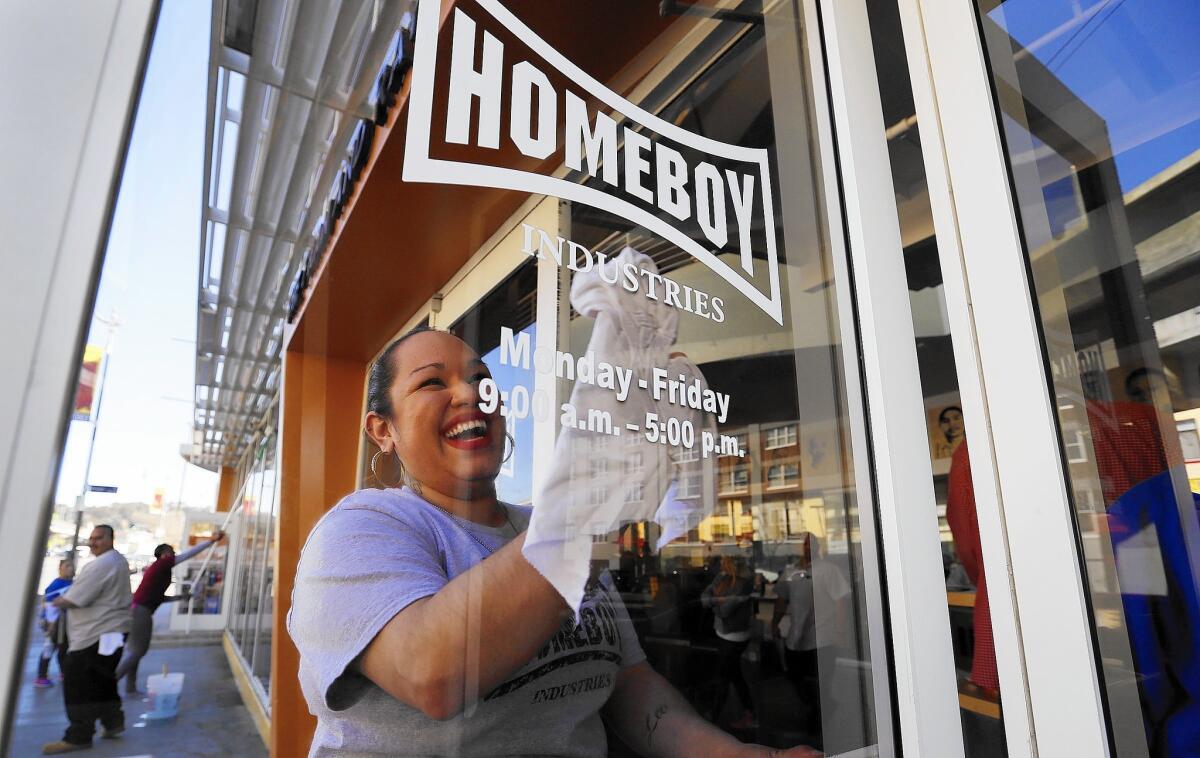Homeboy Industries hopes more space will better serve gang community

- Share via
Homeboy Industries was in trouble. The famed Los Angeles institution founded by Father Gregory Boyle in 1988 to help steer people away from the gang life through job training and counseling was going broke.
The Jesuit priest had started Homeboy Industries during the peak of L.A.’s gang wars, when as many as 2,000 people could be killed in a given year. But in 2010, it was the gang members who were consoling Boyle as his organization struggled to survive, laying off some of its staff.
Now Homeboy, located in a two-story office building in Chinatown, is in the midst of a remarkable turnaround. The nonprofit recently purchased a 6,000-square-foot building next door so it can better serve the community.
The offices that had gone dark during the recession are once again crammed with employees and volunteers, some of whom work in stairwells, break rooms or wherever else they can find space. Homeboy employs about 300 people.
“There isn’t a gang member in this county that doesn’t know about this place. And my guess is that there isn’t a gang in the county that hasn’t seen a member walk through those doors,” Boyle said. “We work with the population that nobody desires to work with, and it’s a principle of this place that we stand with them.”
About 250 people are enrolled in Homeboy’s 18-month job training program. Each week, an additional 500 to 600 come in to access counseling and other services, adding to the tens of thousands who have sought help through Homeboy over the years.
The desperately needed new space will provide welcome relief and allow Homeboy to provide better services to existing clients, said Thomas Vozzo, Homeboy’s chief executive. In addition to job training and counseling, Homeboy provides mental health services as well as job placement, tattoo removal and educational services.
“With that steady financial footing we’ve been on over the last couple of years, it’s time to take on a little bit of an expansion,” Vozzo said.
For all the praise Homeboy Industries has received for its work, it has struggled to raise revenue. The recession saw private donations drop, and the number of jobs available for graduates of Homeboy’s various programs declined.
Boyle conceded that he had to think more like a businessman.
Homeboy’s board of directors has raised $10 million in each of the last two years through individual donors and foundations and has even managed to build up a reserve. Homeboy also has received a $600,000 line of credit and a $700,000 loan for the new building acquisition through Wells Fargo.
But the expansion doesn’t reduce the need for funds — the program receives less than 2% in government funding, Vozzo said. More space, for example, doesn’t necessarily translate into being able to serve more trainees.
“By getting that one building there, it’s not going to allow us to have more people in our program, it’s just going to allow us to do a better job of providing them services in a better environment,” Vozzo said.
Homeboy Industries is planning a grand opening for the new building in April, with the full facility occupied in May. The goal is to eventually take over a whole city block in Chinatown, where the organization can construct a larger building and provide more services to more people, Vozzo added.
For now, employees and volunteers are forced to get creative with space. Maria Flores, director of case management, said that when a client has a crisis, a case manager will either have to ask other workers to leave the shared offices or take the client for a walk outside.
“It has been a challenge,” Flores said. “With the expansion of the building, it’s going to allow for more of a confidential space, and it’s going to allow for relationships to flourish more easily and help the relationship to grow and for the client to trust. … Space does matter.”
Inez Salcido, a former gang member, is participating in the 18-month training program at Homeboy and is working on getting her GED. When seeking help from one of the dozens of tutors at Homeboy, the 39-year-old has had to receive lessons in the cafe, in the breakroom and even on the sidewalk outside.
Frustrated by the lack of space, she said she’s even had to call off some of her tutoring sessions.
“I think once there’s more space there’s not going to be an excuse. We’ll have the room now,” Salcido said. “I think it’ll give myself and others the opportunity to get the most out of what they offer here. Everyone can get the help that they need.”
More to Read
Sign up for Essential California
The most important California stories and recommendations in your inbox every morning.
You may occasionally receive promotional content from the Los Angeles Times.














